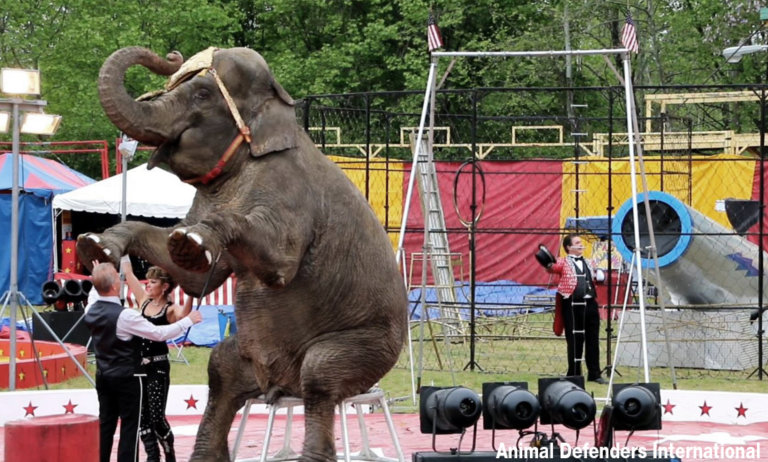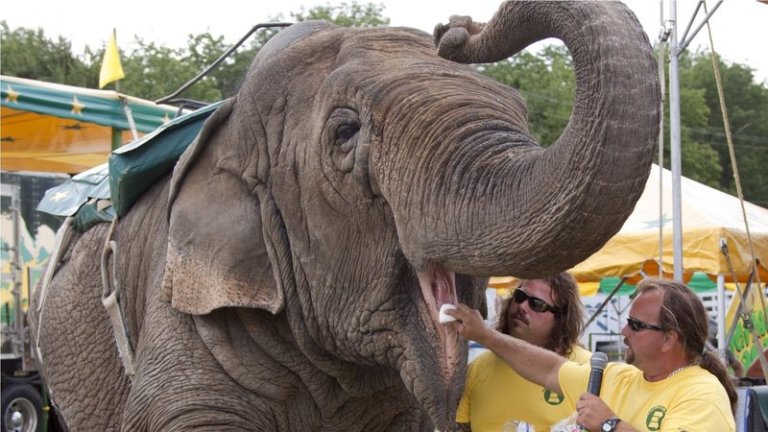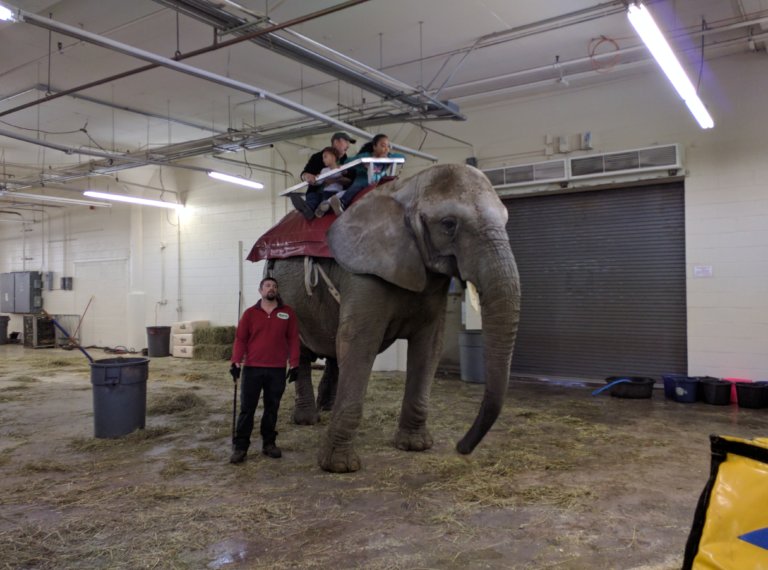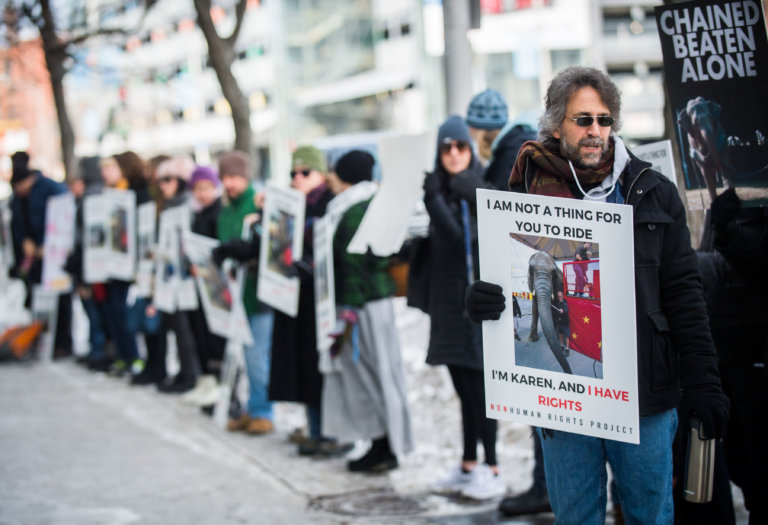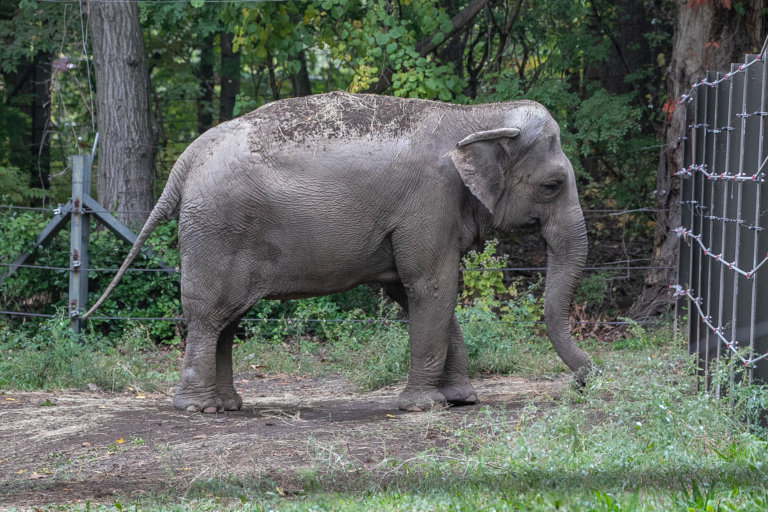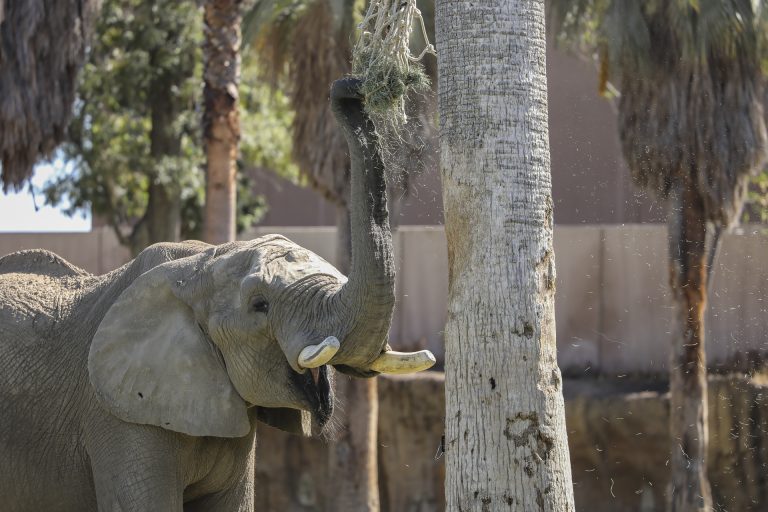Beulah, Karen and Minnie's story
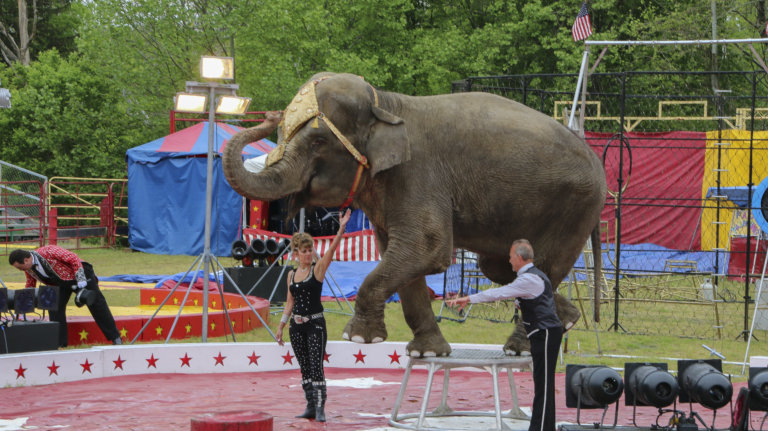
Beulah, Karen, and Minnie
Beulah, also known as Beulah Mae, was an Asian elephant who was born in the wild in Myanmar in 1967 and imported to the US sometime between 1969 and 1973. In 1973, she was sold to the Commerford Zoo in Goshen, CT, which frequently used her in circuses and fairs where she was power-washed (“complete with a gaggle of onlookers crowded around with lawn chairs, boxed lunches and soda”) and forced to give rides to children and adults, among other activities. The Commerford Zoo also used her in commercials and theatrical performances, including a 1981 production of the Connecticut Opera’s Aida staged at a sports arena. Beulah suffered for years from a foot disorder. On September 15, 2019, Beulah collapsed and died at the Big E fair in West Springfield, MA as a result of blood poisoning caused by a uterine infection.
Karen was an African elephant who was born in the wild in 1981 in an unknown location. Imported to the US by Jurgen C. Schulz—who ran an import-export business for exotic animals and now owns the Kifaru Exotic Animal & Bird Auction—Karen was sold to animal trainer Richard “Army” Maguire in 1984. Later that year, Maguire sold her to the Commerford Zoo, which also frequently used her in circuses and fairs. Karen died in March of 2019 of kidney disease.
“Karen was working for her breakfast Thursday morning. She gave a high five and did a little breakdance and bowed … She’s been coming to the state fair for about six years. You can take a ride on Karen for $4.” – Elephant Rides: $4 (The Post-Standard, 8/24/06)
Minnie, also known as Mignon, is an Asian elephant who was born in the wild in Thailand and imported to the US in 1972 when she was two months old. Shortly after, Earl and Elizabeth Hammonds, in search of a baby elephant to incorporate into their traveling petting zoo, purchased her for $4,000 and transported her from Florida to their New Jersey home in a VW bus so she could become “the first elephant in the world to be raised as a member of a household,” as they write in their 1977 book Elephants in the Living Room, Bears in the Canoe. “To pay Mignon’s bills … Mrs. Hammond rents her for parties, sales promotions and Republican political gatherings. Averaging two bookings a week, Mignon just pays her way.” In 1976, the Hammonds sold Minnie to the Commerford Zoo, which frequently uses her in weddings, film productions, photo shoots, circuses, and fairs.
Minnie has a history of attacking her handlers, injuring them and members of the public, including a 2006 incident in which, as PETA documented in a 2010 factsheet, “as children were being loaded onto the elephant, [Minnie] became agitated and suddenly swung her head toward the two employees, shifting her weight and pinning them against the loading ramp. An eyewitness reported that one of the employees had provoked the elephant by striking her in the face.” Despite this history, the Commerford Zoo still forces her to give rides, as indicated on the travel itinerary the Commerford Zoo submitted to the USDA in March 2017. She is the only Commerford Zoo elephant who is still alive.
Donate to support the fight
Donate online
Mail a check
611 Pennsylvania Ave SE #345
Washington, DC 20003
Planned giving
Create a fundraiser
Highlights from the fight
Media coverage
A timeline of Beulah, Karen, and Minnie’s case
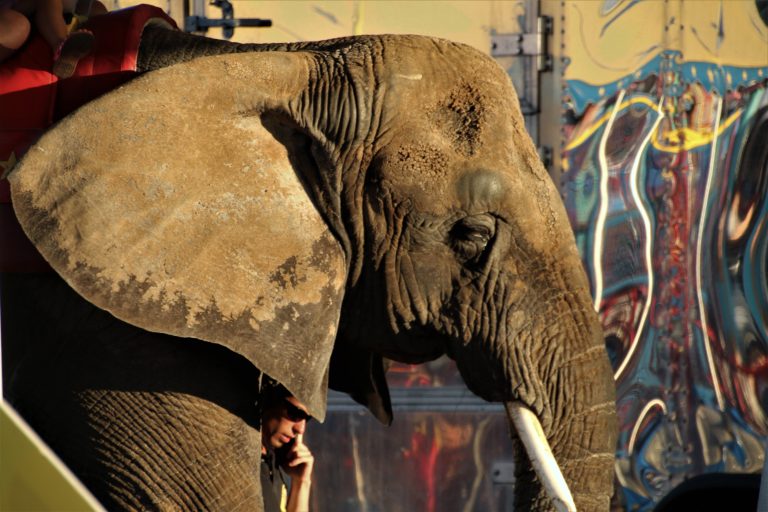
11.13.17
The NhRP files a petition for a common law writ of habeas corpus in Connecticut Superior Court, Litchfield County to demand recognition of Beulah’s, Karen’s and Minnie’s right to liberty and their release to an elephant sanctuary. Affidavits are submitted in support by elephant cognition and behavior experts Lucy Bates, Richard M. Byrne, Karen McComb, Cynthia Moss, Joyce Poole, and Ed Stewart.
12.26.17
1.16.18
The NhRP files a motion to reargue with the Connecticut Superior Court, Litchfield County, asking the court to reverse its dismissal. Our Memorandum of Law brings to the court’s attention several significant errors in the decision, including labeling the case “frivolous” simply because it is novel and ignoring long-standing Connecticut precedent in concluding that the NhRP does not meet the requirements for third-party standing in a common law habeas corpus action. Read our press release here.
2.27.18
Judge Bentivegna denies the NhRP’s motion to reargue and refuses to allow us to amend our petition—primarily, he said, because the basis of our petition was not constitutionally protected liberty, i.e. a liberty interest protected by the due process clause of the Fourteenth Amendment. As we tell the media in our announcement of our plans to appeal, this may indeed be the kind of liberty that a convicted prisoner needs to invoke habeas corpus in the state of Connecticut. But it never has been the kind of liberty that individuals who are not convicted prisoners, such as our three elephant clients, need to prosecute a common law writ of habeas corpus under the law of Connecticut or anywhere else in the world.
3.16.18
The NhRP files a notice of appeal of both the denial of our petition and the denial of our motion to reargue.
4.18.18
The NhRP files a Motion for Articulation with the Connecticut Appellate Court, seeking clarification of the legal and factual basis for Connecticut Superior Court Judge James M. Bentivegna’s 12.26.17 decision and 2.27.18 decision.
5.23.18
6.5.18
The NhRP files a Motion for Review of Judge Bentivegna’s decision.
6.11.18
Seeking to avoid undue delay in securing the liberty of its clients, the NhRP files a second habeas corpus petition (Petition II) and Memorandum of Law in Tolland County because of that Court’s extensive experience and expertise with habeas corpus petitions. “Under Connecticut law, we have the right to file a second petition for habeas corpus,” says NhRP President and lead attorney Steven M. Wise in the NhRP’s press release. “A denial of standing is not considered a judgement on the merits. Beulah, Karen, and Minnie deserve to have their case fully and fairly litigated in the Connecticut courts—not just for their sake, but because these novel legal issues demand it.” Submitted with the second petition is an affidavit by Mark A. Dubois, a Connecticut attorney and expert in legal ethics and professional responsibility who served as Connecticut’s Chief Disciplinary Counsel for nearly a decade and has taught law and lawyers’ ethics at Yale Law School, the University of Connecticut School of Law, and Quinnipiac University School of Law. In his affidavit, Dubois states that the NhRP’s case “is not frivolous, in whole or in part” and urges the Court to allow the NhRP’s case to proceed.
9.25.18
Citing errors by the Connecticut Superior Court and New York judges’ recent embrace of nonhuman animal legal personhood and rights, the NhRP files a brief in The Appellate Court of Connecticut, seeking review of the lower court’s dismissal of our first petition (Petition I).
11.13.18
Four amicus curiae briefs are submitted in support by Laurence H. Tribe, Justin Marceau, Samuel Wiseman, Brandon L. Garrett, Mark Dubois, and a group of philosophers.
1.24.19
Following a status conference, Connecticut Superior Court Judge Dan Shaban orders oral argument on a Motion to Rule filed by the NhRP regarding our second habeas corpus petition. The NhRP is urging the Court, in accordance with Connecticut habeas corpus procedure, to promptly rule on whether it will issue the NhRP’s requested Writ of Habeas Corpus “so that Beulah, Karen, and Minnie’s ongoing illegal detention may be addressed at last.” Additionally, the NhRP is asking the Court not to stay the case while the NhRP waits for decisions from either the Appellate Court or the Supreme Court on our appeal of Judge James Bentivegna’s 12.27.18 decision on the issue of standing regarding our first habeas corpus petition (a “stay” order temporarily stops a judicial proceeding).
2.13.19
Judge Shaban dismisses our second petition on the grounds that our second and first petitions “are exactly alike and are brought to adjudicate the same issues.” As we carefully took pains to explain in our written submissions and oral argument, the two cases are not alike and, even if they were, the NhRP was permitted to bring a second petition as the first petition was not dismissed on its merits and therefore could be brought again.
3.27.19
The Appellate Court of Connecticut schedules a hearing on April 22nd regarding the lower court’s dismissal of our first petition.
4.22.19
In a packed courtroom before a panel of three judges, the NhRP argues that the lower court based its dismissal of the NhRP’s first petition on serious and reversible errors of law. NhRP President Steven M. Wise tells the Court that the NhRP’s elephant rights case is the first time in 350 years a Connecticut court has dismissed a habeas corpus petition because the petitioner was assumed to lack a relationship with the individual whom the petitioner sought to free from unlawful imprisonment. To accommodate the judges’ questions, the Court extends the duration of the oral argument to over twice the time originally allotted, from 20 to 40 to 50 minutes, going beyond the issues on appeal—standing and frivolity—to the ultimate issues at stake in the case: whether the elephants, as autonomous beings, are legal persons entitled to habeas corpus relief. Read our press release here. Watch the hearing here.
8.9.19
8.16.19
The Appellate Court of Connecticut issues a decision on the dismissal of the NhRP’s first petition. “It is for Beulah, Karen, and Minnie’s sake that we lament this Court’s failure to confront the injustice of our elephant clients’ thinghood and lack of rights,” says NhRP President Steven M. Wise in a statement.” It is their rightlessness that keeps them imprisoned and exploited in the Commerford Zoo.” The NhRP announces it will seek further review of the decision in Connecticut’s highest court, the Connecticut Supreme Court.
9.1.19
The NhRP files a motion for en banc reconsideration, which asks all nine judges of the Connecticut Appellate Court to review the appellate decision because it directly conflicts with controlling Connecticut Supreme Court and Appellate Court precedent.
9.12.19
The Court denies our motion for en banc reconsideration.
9.18.19
The NhRP learns Beulah collapsed and died on 9.15.19 at the Big E fair in West Springfield, MA. In our statement, we announce we have sent a letter to the Commerford Zoo demanding that they confirm within 48 hours whether she is alive or dead.
9.26.19
The NhRP files papers in the Connecticut Supreme Court asking it to hear the NhRP’s appeal of the Appellate Court decision and to grant a temporary injunction preventing the Commerford Zoo from moving Minnie out of state. Read our press release here.
10.2.19
The Connecticut Supreme Court declines to hear the NhRP’s appeal of the Appellate Court’s August 2019 decision and to grant a temporary injunction preventing the Commerford Zoo from moving Minnie out of state.
10.15.19
The NhRP files a motion asking for permission to file a supplemental brief to address our standing to sue (in our Petition II brief, we didn’t address standing because Judge Shaban didn’t dismiss Petition II on the basis of standing). As we told the court, we should be afforded the opportunity to address the standing issue before it rules on our second appeal. Additionally, because we remain concerned about the likelihood of the Commerford Zoo moving Minnie to Florida or otherwise out of the jurisdiction of the Connecticut courts, we also file a motion for a temporary injunction to prevent the Commerford Zoo from moving her out of state while her appeal is pending.
10.17.19
The Appellate Court grants the NhRP permission to file a supplemental brief.
11.15.19
The NhRP files a supplemental brief, arguing the Appellate Court should disregard its decision on Petition I as it is clearly wrong.
1.18.20
During oral argument before the Appellate Court, the NhRP reiterates that the Court’s prior decision is riddled with serious legal errors and totally unlike any decision in habeas corpus history and that the Connecticut courts have ruled against the NhRP on the merits of Minnie’s case without actually giving the NhRP the opportunity to argue the merits. Watch the proceedings here.
1.30.20
The NhRP files a letter notifying the Appellate Court of a decision issued by the Connecticut Supreme Court—the state’s highest court—that has a direct and significant bearing on her current appeal.
5.14.20
The Appellate Court again denies habeas relief to Minnie. “The court’s continued assertion that in Connecticut a third party, such as the Nonhuman Rights Project, cannot bring a habeas corpus case that demands that an autonomous being who has long been considered to be a rightless legal thing should now be considered a legal person—able to have her right to bodily liberty asserted by that third party—not only contradicts almost two centuries of Connecticut law, but also the law of every English-speaking jurisdiction in the world,” writes NhRP President Steven M. Wise of the decision.
6.3.20
The NhRP files a motion with the Connecticut Supreme Court, requesting permission to appeal the Appellate Court’s 5.14.20 decision.
7.7.20
The Connecticut Supreme Court declines to hear Minnie’s case.
12.16.20
The NhRP announces we have decided to conclude our Connecticut litigation for the foreseeable future given the Connecticut courts’ continued unwillingess to engage with the substantive issues of Minnie’s case. Read our statement here.
Amicus support

Relevant legislation about Beulah, Karen, and Minnie
